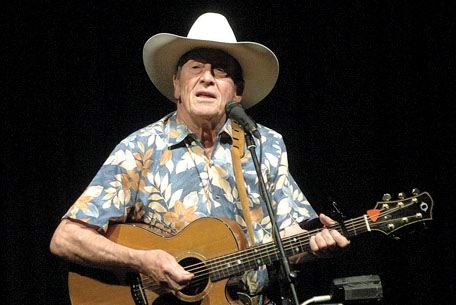He is a man of few words in conversation, but he has more than pulled his weight in words written and words sung.
Ian Tyson has been prolific and has repeatedly conjured the magic of language in definitive classics like Four Strong Winds, Summer Wages, Navajo Rug, The Letter, and others. He is one of cowboy culture's modern icons, and was one of the first Canadians (along with his then-wife Sylvia) to blow past the 49th parallel into global music fame.
At 81, Tyson is a giant of Canadian culture and still producing relevant music. He just released his latest package of songs, Carnero Vaquero. Of these two Spanish words, the first means "ram" and the second is the root of the Anglicized term "buckaroo" or more literally "cowboy."
With it, Tyson rams his way into the next phase of his career. It is ironically a phase that steps deftly aside from the ultra-western personality of his past dozen-or-so albums.
"Some of it is (old-school cowboy material), but the new album is pretty eclectic. It's about the world we live in," he told The Citizen. "I can't write the hardcore cowboy stuff anymore, now, because I've written that, mined that area, for a long time."
Tyson hasn't produced much new music in awhile, if you gauge him by the album-per-year pace of most acts wearing a cowboy hat. In 2012 he released the original collection Raven Singer, in 2008 there was Yellowhead To Yellowstone And Other Love Stories, and in 2005 there was Songs From The Gravel Road.
In between were tribute releases by other singers doing his tunes (Blue Rodeo, Corb Lund, Gordon Lightfoot, Jennifer Warnes, etc.), a couple of DVDs, and some book projects including the bestseller autobiography The Long Trail: My Life In The West and the children's story La Primera illustrated by equine artist Adeline Halvorson based on the song by Tyson about the original horses brought to North America in the 15th century. There were also some greatest hits compilations.
Not a bad streak, really, for a man at the honda end of the lariat. But he came out of the chute this time with a bit more spit and iron than latter years. He had been given a rare second chance at this life, and he felt the power of that fateful twist in his favour.
In 2006, fate looked cruel. Tyson's voice was already substantially losing its muscle when he made the wrong choice to over-sing, one night, and it ravaged his vocal folds. The destruction to his singing ability was something Tyson called "an unthinkable end to my performing career."
Except it wasn't. In similar fashion to how surgeons saved superstar pop singer Adele from vocal damage, Tyson was operated on in 2012 and the results put decades of quality back into his throat.
Fans are coming out now to hear the improvement, and also to share the gratitude, since most of his followers weren't sure he'd ever tour again.
"I wasn't sure either," he confessed. "It was kind of like a small miracle, thanks to a wonderful doctor in Calgary. That whole business has been revolutionized, with the incredible advances in technology. And hey, I'm not going to screw it up this time, I promise."
Armed with a new vocal strength and buttressed with inspiration, he set to work on a brand new album.
"We've been messing with it for about a year, and I'm glad we did because it looks like it might be the best thing I've done in a lot of years," he said. "There are a lot of collaborations on it, in the songwriting end of it (his old friend Tom Russell, alt-rocker-poet Kris Demeanor, etc.) and we did it live in my old stone house which has got a sound all its own. You never know if the magic's going to be there. You just give it your best shot. And the magic was there. It was really a wonderful series of sessions."
Tyson is seeing life through new eyes, but some of what he sees isn't perception: it really is all new. He marveled, not entirely with pleasure, at the unrecognizable face of Dawson Creek as he passed through on his way to Prince George, and bristled a bit at the news of the industry boom going on in the Kitimat-Terrace-Prince Rupert area. For a blue-collar kind of man, he harbours an unstereotypical world view.
"The oil and gas thing is still with us, but you can see the end from here, though. You can see the end," he said.
Although he's been commenting for years on the cowboy way of life getting buffeted around by the winds of modernity, he seems to say in an unspoken way that agriculture, the renewable industry everyone depends on at least three times a day - that is something without a foreseeable end. That's something he can sing for. That's something he can write about.
He'll be putting words on the table tonight at Vanier Hall. Tickets ($61 each) are available at the door. Showtime is 7:30 p.m.



